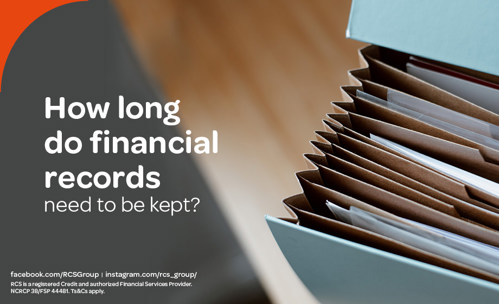How Long to Keep Financial Records?
10 AUGUST 2023
Throughout our lives, we collect various financial records from transactions, payments, and family documents. The importance of these records may not be apparent, however, they can be key in ensuring financial security. Read further to learn more about keeping financial records. Financial records are official documents that represent personal finances or business transactions. These are essential documents to keep as they are proof of certain events or transactions occurring. Keeping business records to minimise risks, manage tax documents, and allow you to plan accordingly. Examples of business records are; tax returns, ownership records, and bank account statements.
Financial records are official documents that represent personal finances or business transactions. These are essential documents to keep as they are proof of certain events or transactions occurring. Keeping business records to minimise risks, manage tax documents, and allow you to plan accordingly. Examples of business records are; tax returns, ownership records, and bank account statements.
Personal records consist of all documents dealing with your finances, for example, receipts, investments, and paychecks. It also includes other important documents like wills, marriage certificates, and birth certificates. Most of these personal records are also filed with local registrars or through online services.
How long to keep personal financial records?
The length of time to keep personal financial records vary according to the type of document and its purpose.
Certain documents need to be kept indefinitely for things that are still active. These include;
- Contracts
- Home improvement records
- Property tax records
- Debt repayments
- Receipts for items with active warranties and have not exceeded return dates
Personal tax returns and other tax documents are important to hold on to as they can make the process of claiming easier and give you reasonable time to challenge. Keep the following tax-related records;
- Tax refunds or credits: For 3 years from when you filed your original return, alternatively for 2 years from the date you paid the tax.
- Loss claims: For 7 years if you file a claim.
- Unreported income: For 6 years if you don’t report and is more than 25% of the total income shown on your return.
- No tax return filed: Indefinitely if you don’t file a return.
- Fraudulent reports: Indefinitely if you file a fraudulent report.
- Employment tax records: For at least 4 years.
Keep records of the following documents for at least 3 years as proof of payments or of previous claims;
- insurance policies
- property sales records
- medical bills that you have paid
Bank statements like paychecks, bill payments are financial records that should be kept for at least a year as they show all your transactions and serve as proof of this.
How long to keep business financial records?
Guidelines for business record keeping is more established and carries more repercussions if not adhered to. Businesses deal with documents regarding employees, clients, and finances, and are all kept for varying periods of time depending on their importance. The general minimum amount of time to keep business records is a minimum of 7 years. The following documents and records should be kept;
- Business Tax Returns and other supporting documents: Until the IRS can no longer audit your return.
- Employment tax records: For at least 4 years after the date they were paid. These include timesheets, salaries, benefits, and UIF payments.
- Employee files: For at least 7 years after an employee has left, or for up to 10 years if a claim against the business has been laid.
- Income taxes: For 7 years if there are deductions for debt loss.
- Worker compensation: For a minimum of 10 years.
- Ownership records: Indefinitely. These are business formation documents, meeting minutes and property deeds, etc.
- Accounting services records: For at least 7 years. Check registers, budgets, ledgers, and audit reports are examples of these records.
- Business operational costs and expenses: For at least 7 years. This type of documentation can be considered supportive in terms of tax returns, eg. bank account statements, credit card statements, canceled checks, or cash receipts.
What records should be kept forever?
Some records should be kept permanently, especially if they concern the livelihoods of your family. These documents should be kept in safety boxes or safes just in case they are needed. Records that should be kept forever are the following;
- Birth certificates or adoption paperwork needed for jobs, education, driver’s license, etc.
- Death certificates for account management, life insurance claims, death benefits, etc.
- Marriage certificates needed for health and life insurance, driver license name change, mortgage loan, etc.
- Wills are necessary for fulfilling the requests of the deceased.
- Records regarding mortgages on housing and property are extremely important documents to keep indefinitely, especially during the transfer or sale of a property.
How to organise financial records?
Records and important documents should be kept safe from theft, fraud, fire, and other damaging circumstances. However, managing reams of paperwork is a daunting task and can end up an unorganized mess that makes it difficult to find anything. Creating a filing system will help you keep track of bills and financial records.
For paperwork, start by collating bills, mail, and other documents and organising them in these categories; Advisors, Auto, Bank Accounts, Bills Due, Contracts, Credit Cards, Education, Employments, Healthcare, Home Maintenance, Insurance, Investments, Loans, Tax Records, To-do/Read, Utilities, Warranties, Wills and Estate Planning. Separate your paperwork by bills to pay, to-do/read, file, and shred.
Digitising your important documents allows for easy retrieval, backups, simpler sharing and safer storage. Records that you should consider digitising are important life documentation, passports, ID’s, health reports, education transcripts and certificates, deeds, loan agreements, and tax returns. To organise digitally, use a mobile scanning app to take images of the documents and upload them onto a secure cloud storage platform like DropBox or Google Drive.
Financial records are essential to have on hand and kept secure. For most documents, they are needed in case of certain situations, so it’s important to have as these situations are not easy to predict. For example identity theft, tax disputes, etc. Use this guide to keep track of how long to keep your records, how to organise them, and be aware of the bigger picture of your finances.
MORE ARTICLES ABOUT
RELATED ARTICLES

Education
12 JUNE 2025
Cultivating Tomorrow's Leaders: Equipping Young South Africans for Life’s Challenges

Education
28 MARCH 2025
Cyber savvy kids: How your children can safeguard themselves against online scammers

Education
17 FEBRUARY 2025
